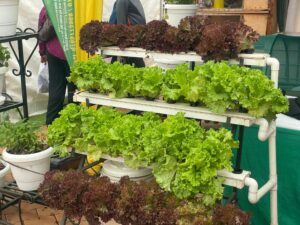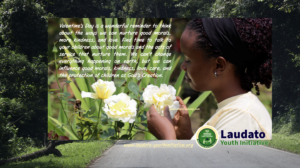Love is not just about what we receive but about what we give. Love is about choosing, every day, to nurture, to protect, and to care. – Benard Omukuyia
Today, the world celebrates love—a word so powerful yet often misunderstood. We exchange gifts, write heartfelt messages, and express affection in ways big and small. But have we ever paused to ask: What kind of love do we celebrate? Is it a love that lasts? A love that nurtures, protects, and sustains?
Pope Francis, in Laudato Si’, invites us to expand our understanding of love beyond romance—to embrace love as care for our common home, the earth that sustains us. If we say we love, then shouldn’t that love extend to the air we breathe, the water we drink, and the world we will leave behind for future generations?
What if love wasn’t just about what we feel—but about what we protect?
As we reflect today, I invite you to consider: Is our love deep enough to care not just for one another, but for the planet that holds us all?
The Depth of Love: Beyond Words and Feelings
Laudato Si’ challenges us to see love as an emotion and a radical commitment to life in all its forms. Pope Francis writes, “Everything is connected” (Laudato Si’, 91). If everything is interwoven, then the way we treat the earth reflects how we love—not just nature, but also the people who depend on it.
Think about this: If we truly love, why do we tolerate actions that harm the environment, knowing they will impact future generations? Why do we allow our lifestyles to contribute to pollution, deforestation, and climate change? Love, when it is real, seeks the good of the other. And love for the earth means ensuring its beauty, vitality, and health for all who come after us.
Love in Action: Ecological Conversion
Pope Francis calls for an “ecological conversion”, a transformation of heart that reshapes our relationship with the natural world. Just as in human relationships, love must be renewed, nurtured, and expressed through tangible actions. In the same way that couples make daily sacrifices for one another, those who love creation must make daily choices to protect it.
1. Could we consume less and cherish more?
2. Could we replace wastefulness with mindfulness?
3. Could we shift from convenience to conscious care?
This Valentine’s Day let’s move beyond temporary gestures of love and embrace lasting expressions of care—for each other and for the world we inhabit.
Simplicity: Love Without Possession
Pope Francis challenges the culture of consumerism, urging us to rediscover the beauty of moderation: “Christian spirituality proposes a growth marked by moderation and the capacity to be happy with little” (Laudato Si’, 222). Love, whether for people or for the earth, is not about control or exploitation—it is about reverence, appreciation, and gratitude. Perhaps this Valentine’s Day, instead of extravagant gifts, we can celebrate love in ways that truly nourish the soul:
1. Taking a walk in nature and marveling at its beauty
2. Preparing a simple meal with local, sustainable ingredients
3. Planting a tree as a living symbol of enduring love
Love does not demand ownership; it seeks the flourishing of the beloved. If we say we love the earth, do our actions show it?
Gratitude: Seeing the World as a Gift
At the heart of Laudato Si’ is a call to gratitude—to recognize creation not as a resource to be used but as a sacred gift to be cherished. Pope Francis urges us to “look at the world with greater attention and love” (Laudato Si’, 97). How often do we pause to truly appreciate the wonder of creation?
Imagine if we treated the earth with the same tenderness and care that we show to someone we love. Imagine if we protected its forests as fiercely as we would protect a child. Imagine if we spoke of its beauty with the same awe as when we describe someone dear to us. Love is not indifferent; it delights in the beloved. Does our love for the earth reflect this kind of devotion?
A Love That Knows No Borders
Love is not just about those closest to us. It is also about those unseen—the poor, the vulnerable, and the generations yet to be born. Environmental destruction is not just a crisis of nature; it is a crisis of justice. The poorest communities suffer the most from climate change, deforestation, and pollution, despite contributing the least to these problems. Can we claim to love while remaining indifferent to this suffering? Love is action. It is solidarity. It is a call to heal the world—not just for us, but for those who come after us.
A Love That Endures
This Valentine’s Day, let love be more than a sentiment. Let it be a force that transforms—not just our relationships, but the way we live on this planet. Pope Francis reminds us, “We need one another; we have a shared responsibility for others and the world” (Laudato Si’, 229). Love is not just about what we receive but about what we give. Love is about choosing, every day, to nurture, to protect, and to care. If we love this world, let us show it. If we love the people in our lives, let that love extend to the home we all share.
This Valentine’s Day, may we embrace a love that does not fade—a love that sustains, heals, and preserves. May our love for one another extend to our common home, ensuring that this he beauty of creation endures for generations to come.
Benard Omukuyia, Doctoral Student, Gregorian University Rome Italy
Environmental destruction is not just a crisis of nature; it is a crisis of justice.














